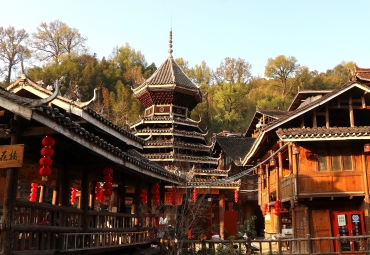A national treasure

Yang Wei, deputy director of the rescue center at the Fanjingshan reserve, takes care of a golden monkey. [Photo provided to China Daily]
The biodiversity and natural beauty of Mount Fanjing, including its status as the lone habitat of the iconic golden monkey, ensure its place among the country's top nature reserves.
Flowers were in full blossom at the foot of Mount Fanjing in early April, while traces of white snow still clung to the mountaintop.
Certain plant species, including dove trees and alpine rhododendron, were budding.
The lush vegetation is a major feature of Mount Fanjing or Fanjingshan, which stands northeast of Tongren city in southwestern China's Guizhou province. The mountain resembles a green island emerging from the vast karst landscape of the region.
Li Guobin is always happy to see the end of winter. The 58-year-old has been keeping watch on the mountain for 15 years.
"When it rains in winter, it gets pretty slippery, and the temperature mostly drops below zero," Li says.
Li often has to walk among the shrubs, traverse narrow winding paths and climb precipitous cliffs in search of traces of wildlife activity and rare plant distribution, taking notes accordingly.
He spends 25 days on the mountain a month and usually takes a tot of liquor to ward off the cold in winter.
"It's hard, but I feel extremely proud that I can help protect the rare animals and plants of our country," Li says.
Fanjingshan is home to more than 7,100 species of wild plants and animals, an important place of biodiversity in the subtropical zone. There are more than 40 different types of forests, comprising, among others, dove trees and hemlock, as well as endangered animals, including golden monkeys, Tibetan macaques, clouded leopards and black bears.
The Fanjingshan National Nature Reserve was established in 1978 and designated a UNESCO Biosphere Reserve in 1986. The reserve covers an area of more than 77,500 hectares and was named a UNESCO World Heritage Site in 2018.
Li is in charge of the Gaoping section in the northeast part of the mountain. The area features relatively flat landscape and is an ideal habitat for the Guizhou snub-nosed monkey, also known as the golden monkey.
Years of experience and his knowledge of the wilderness have made Li feel at home in nature. He can distinguish different animals by their feces, and identify various plants.
To better protect biological activity, the Fanjingshan administration has set up observation stations and put in monitoring equipment.
Li is among more than 100 forest rangers who have stood guard over the mountain through the years.
The rangers wear camouflage uniforms and mountaineering shoes, and carry a bag stuffed with a tent, food and supplies whenever they are out in the woods.
All rights Reserved. 京ICP备13028878号-8







 Overview
Overview Guiyang
Guiyang Guian New Area
Guian New Area Liupanshui
Liupanshui Anshun
Anshun Qianxinan
Qianxinan Qiandongnan
Qiandongnan Qiannan
Qiannan Zunyi
Zunyi Tongren
Tongren Bijie
Bijie Guizhou commits to culture preservation and rural vitalization
Guizhou commits to culture preservation and rural vitalization Guizhou voice at 2025 national two sessions
Guizhou voice at 2025 national two sessions Meet the 'genius moms' at Shenzhen cultural fair
Meet the 'genius moms' at Shenzhen cultural fair 

